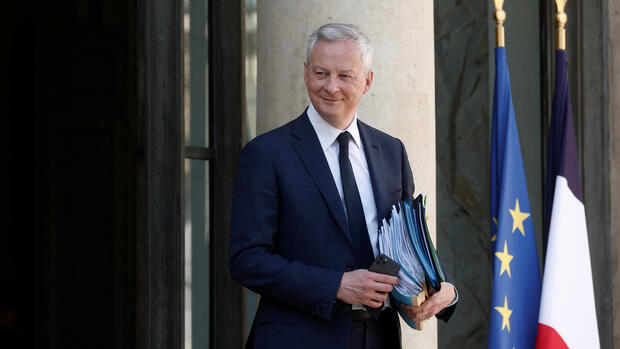Paris France is heading towards three trillion euros in national debt. is not a European country in absolute terms it is as heavily indebted as the second largest economy in the euro zone. According to the French statistics authority Insee, the debt burden in relation to gross domestic product (GDP) was 111.6 percent at the end of 2022 – and thus well above the 60 percent limit once agreed in the European Union.
The French government has now presented a plan with more ambitious budget consolidation targets. “We are accelerating France’s debt relief,” Finance Minister Bruno Le Maire said in Paris on Thursday. However, the situation is made more difficult by the higher interest burden – and by possibly overly optimistic forecasts for economic growth.
The budget deficit is to fall from the current level of just under five percent of GDP to 2.7 percent by 2027, which is below the EU’s three percent limit for new borrowing. So far, Paris had targeted 2.9 percent in 2027. The national debt should then also amount to 108.3 percent of economic power, four percentage points less than in the previous medium-term financial plan of the French government.
Le Maire said that the crises of recent years have led to higher public debt across Europe. France has “protected” its citizens and businesses with heavy spending in the pandemic and in the fight against inflation and in particular against high energy prices. Now, however, the focus must be on debt sustainability.
The minister stressed that France had already initiated the fiscal policy turnaround in 2022, with a limit on aid in the energy crisis. The state cap on gas and electricity prices and other measures such as food checks are to be phased out completely in the foreseeable future.
Macron is looking for more ways to save
In addition, the government of President Emmanuel Macron is looking for further savings potential. Macron’s Prime Minister Élisabeth Borne asked all ministries in a letter sent on Wednesday evening to look for ways to reduce their spending by five percent with a view to the budget negotiations for 2024. The state ratio, i.e. the ratio between state spending and the country’s economic output, is to fall from the current 57.5 percent to 53.5 percent by 2027.
With an austerity course, however, Macron would run the risk of driving the citizens to the barricades again after the struggle over his pension reform. Despite months of protests and strikes, the president passed the controversial law without parliament. His reasoning: raising the general retirement age from 62 to 64 years is necessary in view of the difficult state of public finances.
>> Read here: French President Macron signs controversial pension law
Le Maire said that by consolidating the budget, the state would retain its financial leeway for future crises. “We’d rather speed up debt reduction today than raise taxes tomorrow,” said the minister. At the same time, he made it clear that no austerity policy would be pursued and that investments would continue.
France relies on higher growth
The government’s strategy is based not least on the fact that France is slowly growing out of its debt. The share of government debt in GDP is to decrease by strengthening economic output. To this end, taxes for companies and citizens are to be further reduced.
However, Paris bases its calculations on a comparatively positive expectation of economic growth. The government expects GDP to increase by one percent this year, while the International Monetary Fund only assumes 0.7 percent growth in France for 2023 in its recently presented spring forecast.
Rising interest rates on government bonds are an increasing burden: in 2022, the French state’s financing costs have already increased by a third compared to the previous year. And interest rates are rising faster than the government thinks.
The Ministry of Finance in Paris now expects the cost of debt reduction to rise to 70 billion euros in 2027. That is almost ten billion euros more than in previous forecasts. Le Maire warned that the interest burden could become the largest item in the state budget.
>> Read also: Will the turnaround in interest rates plunge the world into a new financial crisis?
The finance minister said that the accelerated debt reduction is also a signal to the European partners. It is about “France’s credibility in the EU”. A reform of the stability pact is being debated in Brussels after the debt levels of many member states have risen well above the actually permitted level as a result of the crises of recent years.
The EU Commission is planning tailor-made plans for debt reduction in each country and this line has met with approval in Paris. On the other hand, the Federal Ministry of Finance in Berlin insists on more binding guidelines for reducing budget deficits and national debt.
More: “Constructive” or “catastrophic” – Lindner’s reform plan for EU debt rules meets with mixed echo

